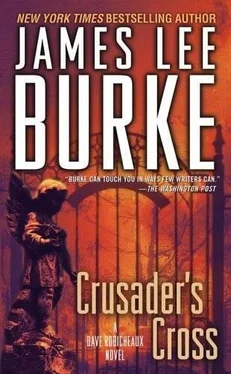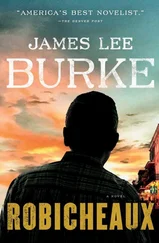"You want to say something, Dave?" the group leader said just before closing.
"My name is Dave. I'm an alcoholic," I said.
"Hello, Dave!" everyone shouted.
"I'm glad to be here and sober. Thanks," I said.
After the "Our Father," I bagged out the door and headed for the department before any overly helpful people decided to chat with me about the Fourth Step.
I buried myself in the baskets of paperwork that had been delegated to me since I had been put on the desk. But I could not get Jericho Johnny out of my head. Clete had cranked his engine. Now neither he nor I could shut it off. In the meantime, Val Chalons had no clue that he was potential sharkmeat.
I hated the thought of what I had to do and fought with myself about it the entire weekend.
By noon Monday I was worn out with it and picked up the phone and called Val Chalons's residential number. The voice that answered was unfamiliar. I could hear hammering in the background, an electric saw whining through wood.
"Where's Mr. Chalons?" I asked.
"Out on the bayou, popping skeets. Well, they ain't exactly skeets."
"Who's this?" I said.
"The carpenter."
"Would you ask Mr. Chalons to come to the phone? This is Detective Dave Robicheaux."
"He said I ain't suppose to bot'er him. Ain't you the guy who beat him up?"
I drove in my pickup down the bayou to the Chalons home. Only Saturday, the old man's ashes had been interred at a secular funeral. The transformation in progress at the property was stunning. A lawn crew of at least a dozen men was weeding out the flower beds, cracking apart and air-vacuuming layers of compacted leaves, ripping vines from the sides of the house, and stacking and burning piles of dead tree limbs.
Roofers, carpenters, brickmasons, and painters were at work inside and outside the house. The oak trees were dark green and looked stiff and clean against the sky. Both the yard and the house were now columned with sunlight. The terrace next to the side porch was already abloom with freshly planted flowers.
I walked through the trees, down the grassy slope toward the bayou. The scene taking place below could have been snipped from a magazine depiction of upper-class life in Cuba or Nicaragua prior to an era of Marxist revolution. A group of people I didn't know were gathered in the shade of a candy-striped awning, eating strawberry cake and drinking champagne, while two shooters with double-barrel shotguns took turns firing at live pigeons that a black man released one by one from a wire cage.
A nice-looking man in seersucker slacks, his tie pulled loose because of the heat, his sports coat hooked on his thumb over his shoulder, passed me on the slope. "How are you?" he said.
"Fine. How do you do, sir?"
"It's mighty hot." But the negative content of his reply was countered by a boyish smile. His hair was closely clipped, the part razor-edged, his face youthful and sincere.
"I've seen you on television. You're Mr. Alridge," I said.
"Yes, sir. I am. Colin Alridge," he said, and extended his hand.
A shotgun popped dully inside the breeze. I saw a pigeon in flight crumple and plummet into the water.
The televangelical lobbyist named Colin Alridge cut his head. "That's an ugly business down there. I thought it was time for me to go," he said.
"It's nice meeting you, Mr. Alridge," I said.
"Yes, sir, same here," he replied.
I watched him walk to his car, a bit awed at our age-old propensity for vesting power over our lives in individuals who themselves are probably dumbfounded by the gift that we arbitrarily bestow upon them. But I had a feeling Colin Alridge would rue the day he had chosen to front points for the Chalons family and their casino interests.
Val Chalons disengaged himself from the group under the awning and walked out in the sunlight, shading his eyes from the glare with his hand. "You don't seem to have parameters of any kind," he said.
"Looks like you're doing quite a restoration on your old man's place," I said.
"I don't care to hear my father referred to in that fashion," he said.
"No disrespect meant. I didn't admire the ethos your father represented, but I liked him personally. Please accept my sympathies."
"You're unbelievable," he said.
Val's face was heavily made up to hide the beating I had given him. But cosmetics couldn't disguise the blood clot in his eye and the stitches in his mouth. Actually I felt sorry for him and wondered again at the level of violence that still lived inside me.
"I've got a problem of conscience, Val."
"Thanks for sharing that, but I couldn't care less. I'd appreciate your leaving now."
I heard one of the shooters say, "Pull." Another pigeon broke into flight, its wings throbbing, only to be blown apart above the bayou.
"That's an unlawful activity," I said.
"Not on my land it isn't."
The sun was boiling overhead. The shotgun popped again, like a dull headache that wouldn't go away.
"A friend of mine inadvertently sent the wrong signal to a guy by the name of Jericho Johnny Wineburger. He's a button man who works out of New Orleans. He's now in our area. I think he might try to do you harm."
I tried to hold his stare but I couldn't. I looked across the bayou at the dust blowing out of a cane field.
"Button man?" Val said.
"A contract killer, a guy who pushes the 'off button on people. Jericho Johnny is a mean motor scooter, Val. He and another dude took out Bugsy Siegel's cousin with a shotgun."
"Bugsy Siegel? This gets better all the time. And you've come here as a police officer to tell me that a friend of yours has aimed this person at me?"
"Yeah, I guess that sums it up."
"Have some strawberry cake, Dave. Maybe a glass of non-alcoholic champagne, too. Back at your AA meetings, are you?" he said.
I walked back up the slope to my truck and used my cell phone to make an animal cruelty report on Val Chalons to the St. Mary Parish Sheriff's Department. I waited for their cruiser to show up before I left, to ensure as best I could that Chalons and his friends would kill no more pigeons that day. But more disturbing than his cruelty was his apparent indifference to the fact that a man like Johnny Wineburger might be in town to break his wheels. That one definitely would not slide down the pipe.
I got back to the office by 1:30 p.m., drinking a Coca-Cola packed with ice and lime slices, my heart rate up, my shirt peppered with sweat. Even in the air-conditioning, I couldn't stop perspiring. I washed my face in the lavatory and went up front for my mail. "Been running up and down the stairs?" Wally said from the dispatcher's cage.
"How'd you know?" I replied.
But it wasn't funny. I could feel the blood veins tightening in the side of my head again and unconsciously I kept pushing at my scalp with my fingers, like a man who fears his brains are seeping out of his skull. Therapists call it psycho-neurotic anxiety. The manifestation is obvious but the cause is not, because the cause keeps itself armor-plated somewhere in the bottom of the id. I know of only one other experience that compares with the syndrome. Your combat tour is almost over.
You're "short," counting days until you catch the big freedom bird home. Except your private calendar doesn't change the fact you're on a night trail in a Third World shithole, wrapped in your own stink, your skin crawling with insects, your toes mushy with trench foot, and out there in the jungle you're convinced Bedcheck Charlie is writing your name on an AK-47 round or a trip-wired 105 dud.
At 1:47 p.m. my Vice cop friend at Lafayette P.D. called. His name was Joe Dupree. Joe had worked Homicide for years before he had gone over to Vice, claiming he had burnt out on blood-splattered DOAs. But some said Joe simply wanted to be closer to a cheap source of narcotics. Sometimes I saw him at AA meetings. Other times I saw him wasted in a baitshop or by himself in his boat, out at Whiskey Bay, doing his own kind of time inside his own head.
Читать дальше












